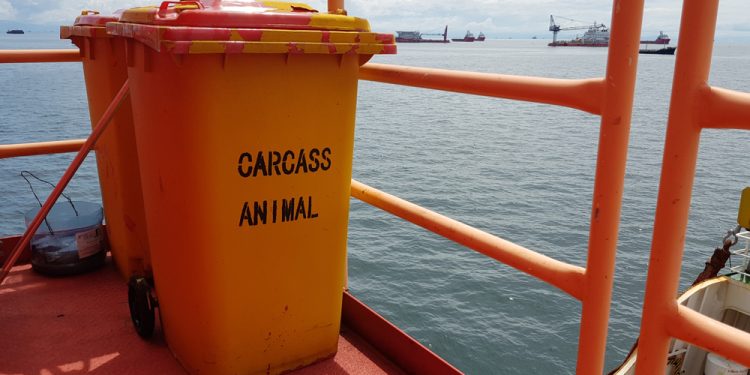Animal carcasses generated during the normal operation of a ship are permitted to be discharged into the sea complying with the provisions of MARPOL Annex V and taking into account the guidelines developed by the IMO.
The Panama Ship Registry has issued a circular on the amendment to MARPOL 73/78, Annex V, to inform that text Under the revised MARPOL Annex V, garbage includes all kinds of food, domestic and operational waste, all plastics, cargo residues, incinerator ashes, cooking oil, fishing gear, and animal carcasses generated during the normal operation of the ship.
Garbage does not include fresh fish and parts there of generated as a result of fishing activities undertaken during the voyage, or as a result of aquaculture activities. What is more, ships carrying live animal cargo consignments are expected to have animals that die during a voyage. These mortalities are generally low and are operational issues to be controlled as part of cargo management practice considered to be generated during the normal operation of the ship and liable to be discharged of continually or periodically and therefore subject to Annex V regulations.
In the event of animal carcasses, an entry in the Garbage Record Book shall be made for each animal carcass incinerated, discharged into the sea or discharged to a reception facility. Where the discharge is to a reception facility, the receipt obtained from the facility should be attached to the Garbage Record Book.
The master of the ship is expected to have responsibility for shipboard livestock operational issues, animal health and welfare, and conditions for the control and reporting of animal mortality on board and is encouraged to provide a copy of the pages of the Garbage Record Book that contain the entries for the discharges of animal carcasses into the sea to the flag State and the State from whose port the voyage originated, and other information requested.
Carcasses of animals resulting from mortalities in excess of those generated during the normal operation of a ship are not “garbage” under MARPOL Annex V and are not covered under the IMO Guidelines.
“Mortalities in excess of those generated during the normal operation of a ship” refers to animal mortalities in excess of those described in paragraph 2.12.2 of the IMO Guideline MEPC 295(71). While this could be a number of animals dying at the same time or within a short period of time, the number of mortalities that exceed those generated during the normal operation of a ship will depend upon the animal species and the total number and/or species carried in the consignment.
To assist in managing the carcasses resulting from mortalities in excess situation, the Masters should contact the flag State of the ship and, where appropriate, port and/or coastal State(s), to seek guidance on the corresponding legal regimes and requirements, as well as IMO guidelines.
































































